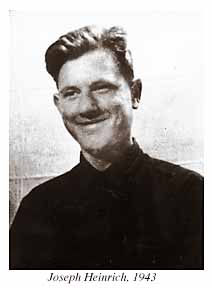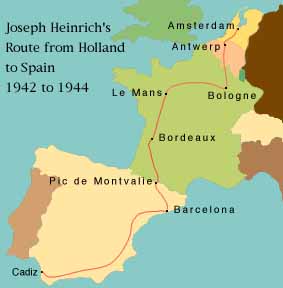 I left Holland in April '43, with my brother. My little sister stayed behind, safe with the family in Friesland. Our plan was to go to Spain, to the American Army, but we were caught on the way.
I left Holland in April '43, with my brother. My little sister stayed behind, safe with the family in Friesland. Our plan was to go to Spain, to the American Army, but we were caught on the way.
 I left Holland in April '43, with my brother. My little sister stayed behind, safe with the family in Friesland. Our plan was to go to Spain, to the American Army, but we were caught on the way.
I left Holland in April '43, with my brother. My little sister stayed behind, safe with the family in Friesland. Our plan was to go to Spain, to the American Army, but we were caught on the way.
Underground in France: We had made our way to Antwerp, where we were staying in a pub called Julia's Anchor, waiting for our guide to Spain--he was the husband of the woman who was hiding us. At first it was just my brother Asher and me, then two other boys showed up, four of us now waiting for this man.
Twice he had made the trip to Spain with Jewish boys from our Dutch pioneer group. We didn't know that on the second trip the Germans caught him. So we were waiting, and meanwhile more and more boys showed up. Now there were ten. One day a neighborhood woman who was friendly with a German soldier, told him, "You know, I think there are a lot of Dutchmen hiding in that place." He came to see for himself. Fortunately, we had work papers and identity papers bearing the swastika stamp--printed by our organization in Holland--saying we were Dutch students working for the Germans in France.
The German police and soldiers were very brutal, but when they saw the swastika stamp, you could tell them just about anything and they would believe it--everything was all right. With the Gestapo, however, it was different; you had to be more careful with them.
We told the soldier we were homesick and had gone home for a visit, but now we wanted to come back to work. He never suspected we were Jews.
"So you ran away from work? Well, now you have to go back!" He gave us an escort of soldiers and put us on a train to France. Well, okay, we thought. France was all right for us; we wanted to be there. They brought us to La Manche, about twenty miles south of Bologne.
For eight months we worked in France, first in the north at Le Mans, later in the south near Bordeaux. Living in France was safer for us: it was easier to disappear into the crowd. Throughout that whole time we stayed in contact with the Westerweel group in Holland. Someone was always going back to bring more kids over the border, one or two at a time.
But how can I explain some of the things that happened? They make no sense. When they took us from the pub to "go back" to work we had to undergo a medical exam by a German doctor; it was not so nice. There were fourteen Jewish boys in the work transport with twenty-five or so non-Jewish Belgians. The doctor was an officer. He checked us from head to foot. But, he did not say one word about what he saw--he said nothing, we said nothing.
 "You want to work?" was all he asked.
"You want to work?" was all he asked.
We were very pleased. Our morale was very high. We went to work for the Todt Organization in France. We were paid wages, and were free to come and go as we wished. It wasn't forced labor.
By then it was very difficult for civilians to buy a train ticket, so we traveled on military trains. We told them, "Look, we are working for you; we are Aryan; we can travel on your trains." They considered the Dutch to be Aryan, so it was all right. We traveled for free. We could never have done that in Holland, but in France we did it several times. Even when we went to the Spanish border, it was on a military train.
When I thought about it afterward, I realized that sometimes we did very stupid things. For example, if we were hungry we took what we called an "order paper"--printed with all the proper stamps by our organization in Holland--and wrote in my false name: "Jaap So and So is traveling from Paris to Lille." We showed the pass to the camp supply commandant. It said I had to travel for twelve hours so I must have bread and sausage for the journey. We signed these passes to each other; sometimes we put four or five names on one, and then we could get food for ten men.
There was a Todt Organization man who was very very tough; we called him "Stucker," after the fighter plane. One time he said to one of our men, "I am sure you are a Jew." We went to the camp commandant to make a complaint: "Why was he calling us Jews?" After that a car was sent to pick us up and take us to work everyday. Everyone else had to walk, but we got a car! The Yiddish word is chutzpah..
When we ran away from Holland we took only what we were wearing. September came and we had no warm clothing, so we wrote ourselves passes and went south, by military trains, of course. We wanted to be close to Spain, but from the Spanish border north for about 80 or 100 kilometers was a restricted military zone. So we stopped about 60 kilometers south of Bordeaux, and there split into two groups.
One day when we met with the other group, they told us they had noticed two young men living in little wooden houses, one right up against the other. They were pretty sure they were Jews. The problem was how to make contact without giving anything away; we couldn't figure it out. Finally one day, when he was within earshot, one of our men whistled "Hatikvah." They whistled "Hatikvah" back! It turned out that the two men were brothers, Hungarian Jews named Greenbaum, who had run away from Paris. We became friends, and later they came with us to Spain.